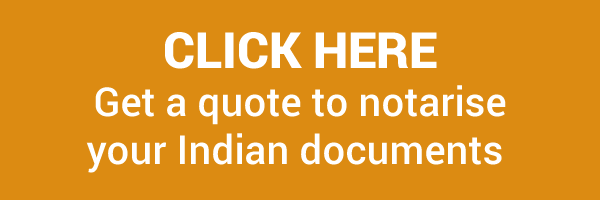If there's a mismatch in your name (ie, your name on your passport and another document are different), it's likely that you must provide a declaration stating that you are the "one and the same person".
Like many of our other clients from India, this commonly can happen when:
- Your name on your passport and your drivers licence is different. If you're attempting to convert your Indian Driver Licence to a driver licence in Australia, but your name on your Indian Passport and your name on your Indian Driver Licence are different, you must follow the IDLV process through VFS. As part of this process, we'll prepare the IDLV affidavit in which you declare that you're the one and the same person. We also provide a notary certificate stating that you're the one and the same person.
- Your name on your passport and your name appearing on your education documents or qualifications are different. If you want to rely on your education document or qualifications for any purpose, but the name on your passport (or another form of primary identification) is different, you may need evidence that you're the one and the same person. Unless there are specific evidence requirements, you can sign a declaration stating that you're the one and the same person. We generally don't prepare this declaration for you, but we can witness your signature and notarise your declaration. If you want to know what to include in the declaration, you should ask the intended recipient whether they have a specific template or sample wording so that you can prepare your own declaration.
- You have legally changed your name. If you've legally changed your name, you can rely on the change of name certificate issued by the registry in Australia. The certificate evidence confirming that you have changed your name. This will be valid in Australia and can be valid in other countries if it has been notarised and/or stamped with an apostille or authenticated and legalised. For more information about the apostille, or authentication and legalisation, please refer to our website and the services that we offer. In addition to the change of name certificate, you can also make a declaration that you're the one and the same person. Again, we don't prepare this declaration for you, but we can witness your signature and notarise your declaration.
- You have married and adopted your spouses name. The naming convention in Australia acknowledges and recognises that people can adopt the name of their spouses. Traditionally, this involves the bride/wife taking the family name of the groom/husband. We acknowledge that with many Indian couples, the husband's name becomes part of the wife's name (regardless of whether the wife originally had a surname). Adopting a spouse's name after marriage does not require a formal change of name. A marriage certificate is usually sufficient evidence to adopt your spouse's name. In addition to the marriage certificate, you can also make a declaration that you're the one and the same person.
If you're sending documents from Australia to India, we also recommend using your passport as your primary identification. Some documents will require your passport number to be verified, while others may refer to your Aadhaar card or PAN card or OCI (if you're no longer an Indian citizen). For our purposes, we'll rely on your passport to identify you and we'll write your passport details on your document as part of the notarisation.
Acknowledgements
This blog is supported and maintained by Phang Legal. Phang Legal is a leading provider of notary public services in Sydney. With offices conveniently located in Parramatta and Rouse Hill, Phang Legal supports and services the Indian community across Sydney with readily available and easily accessible notary public services at highly competitive rates.
Frequently asked questions regarding our notary public services can also be found at https://www.notary-parramatta.com.au/faqs/.

Ern Phang
Notary Public
Ern Phang is the solicitor director of Phang Legal and a notary public. Ern regularly writes about his experiences as a notary public, including the kinds of problems and solutions that his clients face when sending documents to India.
IMPORTANT: the information in this article is correct at the time of publication, however, the law constantly changes. This means you should always refer to the most recent articles because we try to update this blog on a regular basis with the most current information.

